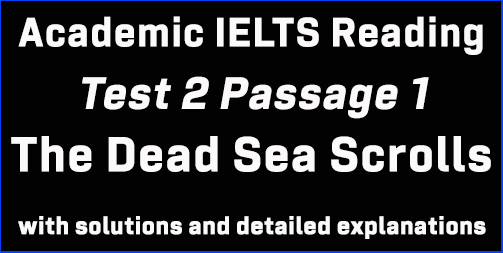IELTS Academic Reading: Cambridge 14, Reading Test 2: Passage 3; Why companies should welcome disorder; with top solutions and detailed explanations
This IELTS Reading post focuses on all the solutions for IELTS Cambridge 14 Reading Test 2 Passage 3 which is entitled ‘Why companies should welcome disorder’. This is an aimed post for candidates who have major problems in finding Reading Answers. This post can easily guide you the best to comprehend every Reading answer. Finding IELTS Reading answers is a gradual process and I hope this post can help you in your IELTS Reading preparation.

IELTS Cambridge 14 Test 2: AC Reading Module
Reading Passage 3:
The headline of the passage: Why companies should welcome disorder
Questions 27-34 (List of headings)
[In this question type, IELTS candidates are provided with a list of headings, usually identified with lower-case Roman numerals (i, ii, iii, etc,). A heading will refer to the main idea of the paragraph or section of the text. Candidates must find out the equivalent heading to the correct paragraphs or sections, which are marked with alphabets A, B, C and so forth. Candidates need to write the appropriate Roman numerals in the boxes on their answer sheets. There will always be two or three more headings than there are paragraphs or sections. So, some of the headings will not be used. It is also likely that some paragraphs or sections may not be included in the task. Generally, the first paragraph is an example paragraph which will be done for the candidates for their understanding of the task.
TIPS: Skimming is the best reading technique. You need not understand every word here. Just try to gather the gist of the sentences. That’s all. Read quickly and don’t stop until you finish each sentence.]
Question 27: Section A
The answer lies in paragraph no. 2 of Section A. “…. . .We are told that we ought to organise our company, our home life, our week, our day and even our sleep, all as a means to becoming more productive. Every week, countless seminars and workshops take place around the world to tell a paying public that they ought to structure their lives in order to achieve this.”
These lines suggest that people are increasingly expected to organise their companies.
So, the answer is: vi (What people are increasingly expected to do)
Question 28: Section B
The answer for this question is found in the first paragraph of Section B. Here, the writer complains that. . . “Ironically, however, the number of businesses that fail has also steadily increased. Work-related stress has increased. A large proportion of workers from all demographics claim to be dissatisfied with the way their work is structured and the way they are managed.”
So, the answer is: i (Complaints about the impact of a certain approach)
Question 29: Section C
The answer is in lines 2-4 of section C, where we find reference of some recommendations regarding business activities which was given in the first half of the 20th century. “… .Writing in the first half of the 20th century, he designed a number of principles to improve the efficiency of the work process, which have since become widespread in modern companies.”
So, the answer is: iii (Early recommendations concerning business activities)
Question 30: Section D
The first line of section D gives us the answer. The writer states, “New research suggests that this obsession with efficiency is misguided.” It means that the beliefs regarding efficiency are misguided or incorrect.
So, the answer is: ii (Fundamental beliefs that are in fact incorrect)
Question 31: Section E
This question’s answer can also be traced to the first line of section E. “What’s more, recent studies show that order actually has diminishing returns.” It means the order (organisation) brings problems. Also, take a look at the following lines. “Order does increase productivity to a certain extent, but eventually the usefulness of the process of organisation, and the benefit it yields, reduce until the point where any further increase in order reduces productivity.” So, it is clear that order does more damage than progress.
So, the answer is: ix (Evidence that a certain approach can have more disadvantages than advantages)
Question 32: Section F
The answer is in the last lines of section F. “These environments can lead to new solutions that, under conventionally structured environments …….. would never be reached.”
Here, would never be reached = impossible
So, the answer is: vii (How to achieve outcomes that are currently impossible)
Question 33: Section G
The second and third paragraph talks about the approach which is taken of Oction, a large Danish manufacturer of hearing aids and the former chairman of General Electric.
So, the answer is: iv (Organisations that put a new approach into practice)
Question 34: Section H
The last lines of section H indicate the answer. Here, the writer says, “This research also shows that we should continually question whether or not our existing assumptions work.” It means there is no guarantee that any approach may work.
So, the answer is: viii (Neither approach guarantees continuous improvement)
Questions 35-37 (Completing sentences/sentence completion with ONE WORD ONLY)
Here, candidates have to complete sentences by using ONE WORD ONLY from the passage. Candidates need to check the keywords from the question parts and try to match those keywords with the information given in the passage.
Question 35: Numerous training sessions are aimed at people who feel they are not _________ enough.
Keywords for this question: numerous, training sessions, aimed at, people who feel,
The answer is in the second paragraph of Section A. Take a look at lines 2-5, “….We are told that we ought to organise our company, our home life, our week, our day and even our sleep, all as a means to becoming more productive. Every week, countless seminars and workshops take place around the world to tell a paying public that they ought to structure their lives in order to achieve this.”
The lines suggest that countless seminars and workshops (Numerous training sessions) are targeted at people who are not productive.
So, the answer is: productive
Question 36: Being organised appeals to people who regard themselves as ____________.
Keywords for this question: being organised, appeals, regard themselves,
The answer is in the first lines of paragraph no. 2 of Section A. “This rhetoric has also crept into the thinking of business leaders and entrepreneurs, much to the delight of self-proclaimed perfectionists with the need to get everything right.”
Here, self-proclaimed = regard themselves
So, the answer is: perfectionists
Question 37: Many people feel _________ with aspects of their work.
Keywords for this question: many people feel, aspects of work
The answer is in paragraph no. 1 of Section B. “A large proportion of workers from all demographics claim to be dissatisfied with the way their work is structured and the way they are managed.”
Here, A large proportion of workers = Many people
So, the answer is: dissatisfied
Questions 38- TRUE, FALSE, NOT GIVEN
In this type of question, candidates are asked to find out whether:
The statement in the question matches with the account in the text- TRUE
The statement in the question contradicts the account in the text- FALSE
The statement in the question has no clear connection with the account in the text- NOT GIVEN
[For this type of question, you can divide each statement into three independent pieces and make your way through with the answer.]
Question 38: Both businesses and people aim at order without really considering its value.
Keywords for this question: businesses and people, aim at, order, without considering, value,
The answer is found in the last lines of Section D. The writer says, “The result is that businesses and people spend time and money organising themselves for the sake of organising, rather than actually looking at the end goal and structure of such an effort.”
The lines mean that people and different businesses actually aim at order (organisation) rather than looking at the goals. So, they are not considering the real value of order but aiming at it for the sake of organising.
So, the answer is: TRUE
Question 39: Innovation is most successful if the people involved have distinct roles.
Keywords for this question: innovation, most successful, people involved, distinct roles,
We can find the answer to this question in Section F. Here, in the first lines, the writer says, “In fact, research shows that, when innovating, the best approach is to create an environment devoid of structure and hierarchy and enable everyone to engage as one organic group.”
Here, one organic group is an antonym for distinct roles.
So, the lines suggest that if people work together as one organic group, innovation is most successful, not if people have distinct roles.
So, the answer is: FALSE
Question 40: Google was inspired to adopt flexibility by the success of General Electric.
Keywords for this question: innovation, most successful, people involved, distinct roles,
In Section G, we find the mention of different companies that adopted flexibility. In paragraph no. 2 of Section G, the writer mentions, “Google and a number of other tech companies have embraced (at least in part) these kinds of flexible structures, . . . .” But, there is no mention of the fact that Google was or was not inspired to adopt flexibility by General Electric.
So, the answer is: NOT GIVEN
Click here for solutions to Cambridge 14 Test 2 Reading Passage 1
Click here for solutions to Cambridge 14 Test 2 Reading Passage 2




I have many problems in true ,false and not given plzz tell me how can i solve this problem
Try to focus on comprehension
Thnq Information Is Very Accurate And Thanks For Giving Answers With Tips.Love This Website 5 Stars ⭐️ ⭐️⭐️⭐️⭐️
You’re most welcome.
39 should also be not given ,as there is no any mention about roles. In one organic group ,there may be more roles within one group . So this can’t be said perfectly that distinct roles should be given or not . Am I right or wrong please tell?
I don’t know how to I study in reading passage 3. This website provide information very specific and accurate.
Can can you check a task 2 written by me to explain me my mistakes and that how much band score I can receive for that essay
Help sir
How to score 7+ in reading
1. Read articles.
2. Learn all the questions types.
3. Manage your time properly.
4. Best way; hire an expert trainer.
Do you think “feel” on the question 37 can still be the synonym of “claim” according to the passage? Should I consider both words for expressing what they have in mind?
Yes
Thanks for the useful information. Any of these information is the best,thank youuu. I HOPE you will continue preparing datum like these.
Again thanks for all